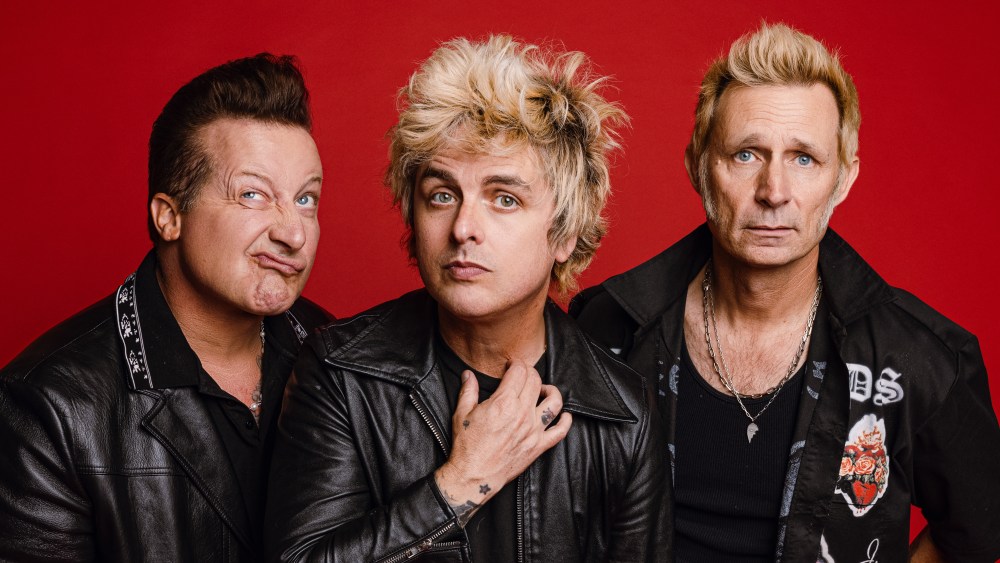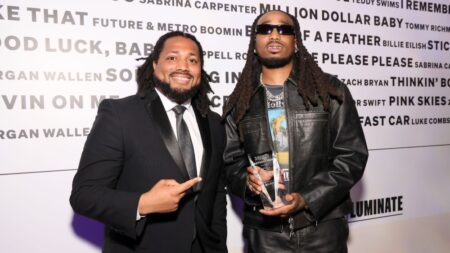It’s been 35 years since Green Day released its debut album, “39/Smooth,” yet, even after decades of milestones — a Tony-winning Broadway musical adapted from the blockbuster 2004 album “American Idiot,” a 2015 induction into the Rock & Roll Hall of Fame and, most recently, a coveted headlining spot at the Coachella Valley Music and Arts Festival — accolades that acknowledge its impact on music still manage to resonate.
That, says lead singer and guitarist Billie Joe Armstrong, includes receiving a star on the Hollywood Walk of Fame on May 1. “Please, anybody can celebrate us anytime that they want,” jokes Armstrong. “It’s always exciting. Now we’re in a time where us kids are getting our day. As people walk and have those dreams and look down at the stars, we can look down and say, ‘Hey, I’m stepping on my face right now!’ Pretty cool.”
The trio — Armstrong, bassist and backing vocalist Mike Dirnt and drummer Tré Cool — has come a long way since their early days as a 1980s punk band gigging in Berkeley. Throughout their career, they’ve sold more than 75 million records across 14 albums and won five of their 23 Grammy nominations, including the coveted record of the year for “Boulevard of Broken Dreams” in 2006. Green Day has impacted across generations, evolving from high-level garage rock to socio-political commentators by elevating and expanding its sound beyond the bratty expectations set with its 1994 breakthrough “Dookie.”
All of this boils down to the core of what gives Green Day lasting power: respecting the art of songwriting. “Trends come and go. For us, we always wanted to write songs that sounded like we recorded them yesterday,” explains Armstrong. “The key is always to write good songs. I think we’ve accomplished that. When someone picks up a record like ‘Dookie,’ it’s a record that sounds like a bunch of guys made it together at a studio last week. For some people, they would never know that record was made 30 years ago. So we’ve been able to accomplish that in the same way as when you listen to something like ‘You Really Got Me’ by the Kinks. That song still resonates for me and it doesn’t sound dated.”
Green Day circa 1994 when their album “Dookie” became a massive hit.
But beyond its sound — distinctly rock with a punk ethos, so hook-driven that pop radio couldn’t ignore it — Green Day has spoken to the times with politically conscious lyrics that rallied against the establishment. Songs like “American Idiot” and “Minority” positioned the band as outsiders who found a way in, platforming radical ideas that expressed frustration with the world around them. It’s a theme common in punk music, the scene where their roots took hold, but few bands have amplified it on a global scale in quite the same way — and managed to maintain it. In that sense, Green Day has always been an overtly political act, one whose message has consistently permeated pop culture with explicit rallying cries and critiques that influenced countless musicians in the years that followed.
The band’s ambitions, of course, started on a much smaller scale. Armstrong remembers falling in love with the spirit of punk at a young age, and his interest in music had early beginnings. (He recorded his first song, “Look for Love,” at the age of 5.) He started jamming with Dirnt after they met in the fifth grade, and two years later, they formed a heavy metal band, playing songs from Ozzy Osbourne and Van Halen before discovering punk groups like Minnesota’s Hüsker Dü and the Ramones.
They founded their first official band, Sweet Children, in 1987 alongside two other members, inspired by the thrash of punk and the community it fostered. “I was on a music journey where I was trying to find more and more music that was probably raw and real, and I think it just led me to start listening to punk, because it just seemed like it was music for outcasts,” recalls Armstrong. “I felt like that’s where I fit in the most. It was just real. When I got into punk, everything before that felt fake to me or something.”
Sweet Children played its first show in 1987 at Rod’s Hickory Pit, a restaurant where Armstrong’s mother worked in Vallejo, Calif. What followed were steady performances in Berkeley with foundation-setting shows at 924 Gilman Street, a formative venue for bands including Jawbreaker and Rancid. It was there that they met Larry Livermore, owner of Lookout! Records and member of rock group the Lookouts, which counted Cool as a drummer.
Livermore signed the band to his imprint and released its debut EP, “1,000 Hours” in 1989 under its newly minted name Green Day, a reference to marijuana. They subsequently released “39/Smooth” and, after drummer John Kiffmeyer left the band in 1990, added Cool to the Green Day lineup, minting their status as a trio.

Green Day in a current publicity photo.
As their stock began to rise on the punk circuit and their 1991 sophomore album, “Kerplunk,” made mainstream waves, major labels began taking an interest in the group and a bidding war ensued. In the punk community, doing business with a massive corporation is considered a big no-no, yet Armstrong and his bandmates felt they were at a crossroads to take Green Day to the next level. “It was a really scary time because it was definitely do or die,” says Armstrong. “But we practiced every single day, we just wanted to make the best record we possibly could, which ended up being ‘Dookie.’”
Green Day ended up signing with Reprise Records — founded by Frank Sinatra and, at that time, a subsidiary of Warner Records — to record “Dookie” with producer Rob Cavallo. The backlash from the punk community was strong — they were banned from performing at 924 Gilman Street, something they later addressed on the song “86” — yet they knew they needed the muscle of a major to give them the push that they needed.
“Before then, before Nirvana, anyone who had ever tried to go from an independent to a major label that was punk that came from a punk scene, it kind of blew up in their faces,” says Armstrong. “They ended up making records that sounded like shit, and sacrificing their sound. At the time, we were like there’s no way. … We were hoping to get as big as maybe Fugazi or something like that, but especially in the Bay Area, coming from the [punk zine] Maximum Rocknroll and Gilman Street scene, people were really uptight about major labels and corporations and who they’re affiliated with and people coming in and infiltrating a scene.”
But the gamble paid off, as “Dookie” struck a chord with audiences worldwide. Released in 1994, “Dookie” is now considered one of the greatest albums of all time, becoming a commercial juggernaut with more than 20 million copies sold globally and earning the Grammy for best alternative album. That year marked a turning point for the band, who gave a career-defining performance at Woodstock ’94 and grafted their brand of melodic punk rock onto the charts.
“Everything kept rising and getting bigger, and hearing ourselves on the radio for the first time, seeing ourselves on MTV for the first time. … Woodstock was the final match that lit the fire where it exploded,” recalls Armstrong. “We were in competition with ‘The Lion King’ soundtrack for the biggest record of the week or month or whatever. It was out of control. So it was really exciting and really frightening at the same time because we went for something where we were growing into something we launched.”

Green Day around the time of “American Idiot,” which sold millions of copies.
As Armstrong puts it, “You get your whole life to make your first record, as they say, but you get 18 months” to write a follow-up album. Green Day attempted to strike while the iron was hot for 1995’s “Insomniac,” a record in line with the electrified rock of “Dookie,” but then smeared the sonic edges for 1997’s “Nimrod” by experimenting with new textures and songwriting approaches. What it yielded was softer, more introspective fare — ballad “Good Riddance (Time of Your Life)” was a cultural force, getting a boost from a key sync in one of the final episodes of “Seinfeld” — that showcased the band’s versatility.
By the turn of the millennium, Green Day had already conquered pop culture as one of the few punk rock bands to etch a spot alongside the slick, polished pop that took hold in the late 1990s. They reached a turning point: After 2000’s “Warning” failed to live up to past glory, Green Day regrouped, taking their ambitions to new heights with the concept album “American Idiot” in 2004. The band approached the project as a “rock opera,” as Armstrong describes it, with lyricism that took plain aim at current events.
“We were writing songs that were more topical and more political, especially after the George Bush administration,” he says. “It was the first time really in our lifetime that we were seeing [the country] going into war for fictitious reasons. We didn’t trust the government; we didn’t trust the president and it was after 9/11. So there was a lot that was in the culture and was on my mind when we were writing that record. I think anytime there’s topical songs, if you do it right, it’ll last forever.”
“American Idiot” was a magnum opus, speaking to the times while musically defining them. It drew in a new generation of fans while concurrently revitalizing Green Day’s relevancy in the changing pop landscape. With smash singles including “Boulevard of Broken Dreams” and “Wake Me Up When September Ends,” “American Idiot” had such a long tailwind that, in 2009, a musical adaptation of the album debuted in Berkeley before moving to Broadway, where it ran for more than 400 performances. Even today, fans still discuss a long-anticipated film version of the musical, which could still be on the horizon.
“There was supposed to be [a film], but it never panned out,” says Armstrong. “I’m sure something is gonna happen. The musical did so well and they’ve done it in Australia, Italy, Germany, England … It’s traveled so well. Eventually it’s going to happen, I would think.”

Billie Joe Armstrong, left, with Mike Dirnt at this year’s Coachella.
Green Day attempted to outdo the success of “America Idiot” with a second concept album, “21st Century Breakdown,” in 2009, winning best rock album at the Grammys.
Throughout the years, the band has continued to push the limits of their creativity — they dropped a trio of albums “Uno,” “Dos” and “Tré” in 2012 — and in the time that followed, continued a pattern of releasing an album essentially every four years, most recently with 2024’s “Saviors,” peppered with international stadium tours.
“You have to live life to write songs about your life,” says Armstrong. “I do like to take my time with the lyrics to make sure that they project the way I feel, internalize what’s going on in my own life and what’s going on in the culture. So that’s important. We live in such a crazy world. Now, everything is wide open. So I think it was at a pace of every four years, but now it’s like you put out a song or an EP, an LP, whatever it is, and with streaming there are no rules.”
For a band that’s sustained its relevance throughout the decades, Green Day holds true to its values, with its members chalking up their legacy to the shared perspective of why they started making music in the first place. “When I approach Mike and Tré, I have so much respect for them,” explains Armstrong. “I know their nuances; I know their quirks. We know everything about each other. So I think it’s allowing each other space but also maintaining a friendship. There were ups and downs for us, for sure, but I see the way bands squabble in front of the world, and I’m like, what the fuck are you doing? Why would you say that? Your relationship is part of the privacy and the respect even if you can’t stand each other. For us, it’s about keeping the integrity of our relationships together as much as making the music.”
Read the full article here








